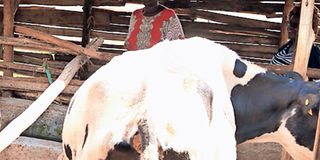Teacher: Why I insured my cows

Grace Mengo in her farm in Nyaribari-Chache. To start the venture, she took a Sh1 million loan from the Agriculture Finance Corporation. PHOTO | BENSON MOMANYI | NMG
What you need to know:
- A farmer can also insure an animal against incapacitation.
- Ms Mengo makes a substantial amount from her animals, she says.
- On a good day, she can make up to Sh2,500.
- Anyone going to Sheba farm on an educational tour pays Sh500.
Ms Grace Mengo spends about Sh27,000 every year for each of her eight dairy cows.
The farmer took the decision to spend "so much" on her cows after losing one of her most productive animals to a strange disease, incurring huge losses.
“The cow died just eight days after calving. I went down with depression, given that the animal produced more than 20 litres of milk a day. I was not psychologically prepared for the loss,” Ms Mengo says.
The primary school teacher says the insurance makes her avoid complete loss in case her animals die, are injured or stolen.
A farmer can also insure an animal against incapacitation.
Gianchore village residents know Ms Mengo's passion for her animals.
All her five adult children left her Sheba farm in Kisii County to find work in other parts of the country.
Ms Mengo makes a substantial amount from her animals, she says.
The teacher has even employed a worker to feeding and take care of the animals when she is attending to other matters.
While away from school, Ms Mengo is busy tending to her animals. She says her greatest moment is when she is with the cows.
On a good day, she can make up to Sh2,500.
The teacher went into dairy farming three years ago after reading success stories in Seeds of Gold magazine.
“I developed interest in dairy farming and wanted to be successful too. I even dreamt of being featured in the magazine,” Ms Mengo says.
Anyone going to Sheba farm on an educational tour pays Sh500.
To start the venture, Ms Mengo took a Sh1 million from the Agriculture Finance Corporation.
“I am almost clearing the loan using the milk proceeds. Getting into dairy farming is an idea I will never regret,” she says.
The teacher received training from the county government agriculture officials. She is now putting all her efforts in value addition.
"Insurance has had bad publicity in the past and that is perhaps why many farmers have not taken policies. I would advice dairy and other farmers to take insurance for their crops and livestock," Ms Mengo says.
“The feeling that comes after being compensated is satisfying.”
County veterinary services deputy director Gerald Manyeki says dairy animals are expensive but farmers should be prepared for unexpected losses.
"Insurance will compensate a farmer should his or her animal die as a result of a lightning strike, internal and external injuries, windstorm, snake bite, electrocution or even flooding," he says.




